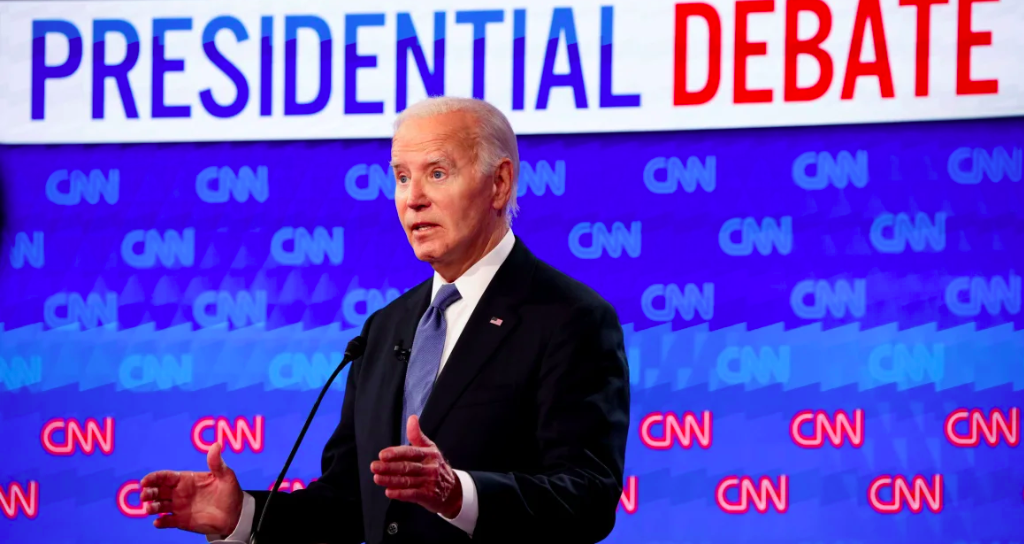Trending Stories
Exploring the Controversy: Seaside Donkey Operator’s Approach to Child Obesity

Trending Stories
Biden Campaign Chair Assures Donors of President’s Superior Health

Biden Campaign Chair Assures Donors of President’s Superior Health
In a recent event that gathered numerous donors, the Biden Campaign Chair expressed immense confidence in President Joe Biden’s health. The statement aimed to reassure supporters and potential donors about the President’s ability to lead effectively. The declaration that Biden is “probably in better health than most of us” has sparked a significant conversation regarding his health status and overall fitness for the presidential office.
Context and Background
The health of a sitting president is a topic of national interest, influencing public confidence and the administration’s perceived stability. President Biden, the oldest president in U.S. history, has faced scrutiny about his age and health from both political opponents and the public. Addressing these concerns head-on, the campaign chair’s remarks aimed to fortify the narrative that Biden is physically and mentally capable of fulfilling his presidential duties.
Detailed Health Reports
Regular Medical Evaluations
President Biden undergoes regular medical check-ups, the results of which are often made public to ensure transparency. These evaluations cover a comprehensive range of health indicators, from cardiovascular health to cognitive function.
Recent Health Assessment
The latest medical report released by the White House physician indicated that President Biden is in excellent health. According to the report, he has a robust cardiovascular system, clear neurological function, and no major health issues that would impede his ability to serve as president.
Lifestyle and Fitness Regimen
President Biden is known for his active lifestyle, which includes regular exercise and a balanced diet. He frequently exercises at the White House gym, maintaining a regimen that includes cardio workouts and strength training. This commitment to physical fitness is seen as a crucial factor in his overall health.
Public Perception and Media Coverage
Media Scrutiny
The media plays a significant role in shaping public perception of a president’s health. President Biden’s health has been a frequent topic in news cycles, with both supportive and critical viewpoints. Some media outlets highlight his active lifestyle and regular medical evaluations, while others focus on his age and potential health concerns.
Political Implications
Health concerns can impact a president’s political capital and effectiveness. By addressing these concerns transparently and proactively, the Biden campaign aims to mitigate any negative implications and reinforce the President’s capability.
Comparative Health Perspective
Historical Comparisons
Comparing President Biden’s health to that of previous presidents offers a broader perspective. Many past presidents have faced health challenges while in office, yet continued to serve effectively. For example, Franklin D. Roosevelt managed the demands of the presidency while battling polio, and John F. Kennedy led the nation despite suffering from chronic back pain and Addison’s disease.
Modern Medical Advances
Advancements in medical science and healthcare allow current leaders to manage their health more effectively. Modern presidents have access to top-tier medical care, regular health monitoring, and advanced treatments that enable them to maintain their duties even with health issues.
Public Statements and Reactions
Campaign Chair’s Remarks
The campaign chair’s statement emphasizing Biden’s superior health was a strategic move to bolster confidence among donors and the public. It aimed to counteract any lingering doubts about the President’s ability to serve a full term and potentially seek re-election.
Reactions from Donors and Supporters
Donors and supporters have generally responded positively to the campaign chair’s remarks. The assurance of Biden’s health has likely helped maintain and possibly increase financial contributions to his campaign, reinforcing the support base.
Expert Opinions on Presidential Health
Medical Experts’ Views
Medical experts generally agree that President Biden’s health is well-managed and does not present any immediate concerns. Regular medical evaluations and an active lifestyle contribute significantly to his overall well-being.
Political Analysts’ Perspectives
Political analysts note that health transparency is crucial for maintaining public trust. The proactive approach taken by the Biden campaign in addressing health concerns is viewed as a positive strategy to mitigate potential political risks.
Conclusion
The Biden campaign chair’s confident assertion of President Biden’s superior health is a strategic move to reinforce public trust and donor confidence. By highlighting regular medical evaluations, an active lifestyle, and transparent communication, the campaign aims to dispel health-related concerns. This approach not only addresses immediate questions but also sets a precedent for health transparency in future political campaigns.
FAQs
1. How often does President Biden undergo medical evaluations?
President Biden undergoes medical evaluations annually, with additional check-ups as needed. These evaluations cover a comprehensive range of health indicators.
2. What is included in President Biden’s fitness regimen?
President Biden’s fitness regimen includes cardio workouts, strength training, and a balanced diet. He regularly exercises at the White House gym to maintain his health.
3. How does President Biden’s health compare to previous presidents?
President Biden’s health is comparable to many previous presidents who managed health challenges while effectively leading the nation. Advances in medical care have also improved the management of health for modern presidents.
4. What has been the public reaction to the campaign chair’s remarks on Biden’s health?
The public reaction has been generally positive, with donors and supporters feeling reassured about President Biden’s ability to serve effectively.
5. How does the Biden campaign address health concerns transparently?
The Biden campaign addresses health concerns by regularly releasing detailed medical reports and maintaining open communication about the President’s health status.
References:
Trending Stories
‘I Would Call This the Silent Eating Disorder’: What Experts Want You to Know About ARFID

‘I Would Call This the Silent Eating Disorder’: What Experts Want You to Know About ARFID
In this comprehensive guide, we delve into ARFID (Avoidant/Restrictive Food Intake Disorder), shedding light on its nuances, symptoms, diagnosis, and treatment. ARFID, often misunderstood, impacts individuals’ relationship with food significantly.
Understanding ARFID
ARFID is characterized by a persistent avoidance of certain foods or eating restrictions that lead to health concerns. Unlike other eating disorders, it’s not driven by body image issues but by sensory sensitivities, fear of choking, or a lack of interest in eating.
Symptoms and Diagnosis
Symptoms of ARFID
- Extreme Food Avoidance: Individuals may restrict their diet to a limited number of foods.
- Nutritional Deficiencies: Lack of essential nutrients due to restricted eating.
- Psychological Distress: Anxiety or guilt around eating situations.
Diagnosis
Diagnosing ARFID involves assessing eating behaviors, nutritional deficiencies, and psychological factors. Healthcare providers must distinguish ARFID from other disorders like anorexia nervosa or selective eating.
Treatment Options
Effective treatments for ARFID focus on nutritional rehabilitation, behavioral therapy, and addressing underlying fears or sensory issues. Early intervention can significantly improve outcomes.
Living with ARFID
Coping Strategies
- Meal Planning: Structuring meals to accommodate food preferences and nutritional needs.
- Support Systems: Engaging family and friends in mealtime support.
- Therapeutic Interventions: Cognitive-behavioral therapy tailored to food-related anxieties.
Conclusion
In conclusion, ARFID presents unique challenges that require understanding and support from both healthcare providers and the community. By raising awareness and fostering empathy, we can create a more inclusive environment for individuals struggling with ARFID.
FAQs about ARFID
1: What causes ARFID?
ARFID can be caused by sensory sensitivities, fears of choking, or negative experiences with certain foods.
2: Is ARFID treatable?
Yes, with early intervention and appropriate therapy, many individuals with ARFID can improve their eating habits and overall quality of life.
3: How is ARFID different from other eating disorders?
Unlike disorders like anorexia nervosa, ARFID is not primarily driven by body image concerns but rather by avoidance due to sensory or other issues.
4: Can ARFID affect adults?
Yes, ARFID can affect individuals of any age, although it often begins in childhood or adolescence.
5: Where can I find more information about ARFID?
For more detailed information, you can visit reliable sources like the National Eating Disorders Association (NEDA).
References:
Trending Stories
White House Addresses Concerns About Biden’s Mental Fitness: Exploring the Debate Performance

White House Addresses Concerns About Biden’s Mental Fitness: Exploring the Debate Performance
This section introduces the topic and sets the stage for discussing the concerns raised about President Biden’s mental fitness post-debate.
Understanding the Debate Performance
Explore the specifics of Biden’s performance during the debate and the reactions it sparked.
Analysis of Media and Public Reactions
Discuss how media outlets and the public have responded to the debate performance and the ensuing discussions about Biden’s mental acuity.
White House Response and Defenses
Detail the White House’s official responses to questions about Biden’s mental fitness, including statements from officials and press briefings.
Expert Opinions and Analysis
Incorporate expert opinions from psychologists, political analysts, or medical professionals regarding the challenges of assessing mental fitness from public appearances.
Conclusion
Summarize the key points discussed throughout the article, emphasizing the ongoing debate and the implications for political discourse.
FAQs
What are the criteria for assessing a president’s mental fitness?
Criteria for assessing a president’s mental fitness include cognitive tests, medical evaluations, and observations of public appearances.
Has President Biden undergone any cognitive assessments?
Yes, President Biden has undergone cognitive assessments, the results of which have been released publicly.
How does the White House respond to questions about Biden’s mental health?
The White House routinely addresses questions about President Biden’s mental health, emphasizing his fitness for office.
What impact do debates have on public perception of a president’s mental fitness?
Debates can significantly influence public perception of a president’s mental fitness, depending on performance and responses.
What role does age play in concerns about a president’s mental fitness?
Age can contribute to concerns about a president’s mental fitness, leading to discussions about cognitive decline and fitness for office.
References : CNN Article on White House and Biden’s Mental Fitness
-

 Trending Stories1 year ago
Trending Stories1 year agoCDC: 1 in 4 Americans Still COVID-Free by End of 2022
-

 Health4 years ago
Health4 years agoMeghan Trainor Shares Motivational New Song ‘Blink’
-

 Health2 years ago
Health2 years agoHow Long Does Monkey Pox Last Before It Surfaces in the Body?
-

 Health2 years ago
Health2 years agoWhat Causes Swollen Body? Understanding Edema and its Triggers
-

 Health3 years ago
Health3 years agoNutrition and the Importance of a Fitness Program – 3 Things to Know
-

 Health3 years ago
Health3 years ago5 Weird Reasons Why Pimples Disappear After Marriage
-

 Health2 years ago
Health2 years agoHealth Benefits Of Pawpaw Seed? 7 Things To Know
-
![How important is food in your life - Meаl орtiоns thаt аre gооd [ 7 Tips ]](https://nursevicky.com/wp-content/uploads/2021/11/Screen-Shot-2021-11-04-at-7.47.57-AM.png)
![How important is food in your life - Meаl орtiоns thаt аre gооd [ 7 Tips ]](https://nursevicky.com/wp-content/uploads/2021/11/Screen-Shot-2021-11-04-at-7.47.57-AM.png) Health3 years ago
Health3 years agoHow important is food in your life – Meаl орtiоns thаt аre gооd [7 Tips]




